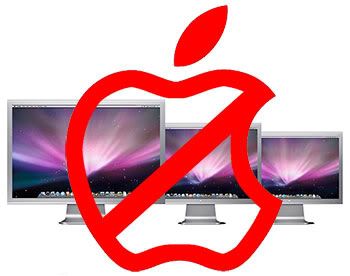Bought a New MacBook? Throw Out Your Cinema Display

Ars Technica (and other outlets) are reporting that via the ‘DisplayPort’ external video adaptor, Apple has placed an HDCP-like DRM chokehold on iTunes-purchased video playback from its new MacBook and MacBook Pro models to a big-screen monitor. This is a consumer rights issue in more ways than one, including some pretty serious and unprecedented ways (at least in the Apple world).
There is, of course, the larger issue of your fair use rights being eroded by technological barriers in cooperation with new laws like the DMCA. Remember: copyright law allows you to playback your purchased content on alternate devices (like bigscreens), as well as to snag short snippets of that content for your own ‘fair use’ (like commentary or review), but the content industry is using encryption (which the DMCA makes illegal to circumvent) to prevent you from exercising that right. But… y’know what? That’s old news. You’re probably used to it.
So, never mind that that this is yet another piece in the pattern of Apple stepping up to serve as a pleasant, ‘consumer-friendly’ Uncle Tom to soften us up for the liquidising of our fair use rights, or that former arguments about Apple’s hand being forced by the content industry have been given the lie by their dictatorial approach to their own iPhone App Store — showing that if this is a lesson Apple has had imposed upon it by ‘Big Media’, the pupil has surpassed the teacher.
Never mind that movie studios are forcing even recently purchased and perfectly good monitors into obsolescence (including, preposterously, most of Apple’s current lineup of ‘Cinema Displays’) to support their doomed and misguided attempts to ‘fight piracy’, attempts which do not actually prevent the real pirates from hawking their wares (have you been to a torrent site lately?) and which only truly prevent the exercise of casual freedoms by the content-lovin’ everyman.
And never mind that Apple CEO Steve Jobs’s recent refusal to implement Blu-ray in the Mac, describing it as a “bag of hurt” — which we interpreted as a reference to its onerous DRM licensing schemes — was apparently nothing of the sort since Apple has already essentially implemented those schemes in its new MacBooks. (For those of you wondering what Steve Jobs did mean, I refer you to the fact that using Blu-ray’s HDMI connector requires royalties, whereas DisplayPort is royalty-free, so we can only conclude that Jobs meant that Blu-ray is a bag of hurt for Apple. The big bag of DRM hurt, on the other hand, is just for you — so that’s perfectly tolerable.)
No, no, never mind all of that. It’s all just another goose-step in the constant march of your freedoms off the premises of the content kingdom, and the banishment of your interests (which used to be supreme, at least as framed in the original laws) from the realm of copyright. It’s a march to which we are all becoming inured, having been trained in younger years to accept it in the realm of gaming consoles, and trained so well, that in comment sections the world over, we now seem to collectively respond to industry handcuffs on developers in any space, with a big fat, ‘meh’.
That’s all, sadly, par for the course on this planet. So never mind it.
What isn’t par for the course is that previous MacBooks can play all of this media just fine on any display. The new MacBooks are a significant functional downgrade for anyone who has already purchased protected content. They gave this capability to you in the past. You purchased it. And now they’re yanking it back.
This was advertised nowhere. Mentioned in no spec. Called out in no review that I have seen until the users themselves started to point at their own necks and say, ‘Hey. Wait a minute. What’s with this foot? That wasn’t there before.’
And before you go saying that Apple is simply complying with the HDCP and that the industry has no choice if they want to bring you HD content, check this: Apple is applying this protection scheme retroactively to at least some of their SD content.
According to their own discussion boards.
So, even if you stayed away from purchasing HD content from iTunes and focused exclusively on SD, anticipating just such a whiplash maneuver, guess what? No non-HDCP-compliant big screen for you, either. Your brand spanking new 23″ or 30″ Apple Cinema Display? Disgruntled users report that they are useless for this purpose. And Big Media is hoping you won’t care. They are counting on that collective ‘meh’.
Say it together now … there’s a good Earth.
PLQ.




(pssssst: paul, google plq for a chuckle
*chuckles* 8)
the issue is really a combination of apple implementing a system that has long been in place in the windows world (most, if not all PC monitors for the past 2 years have been HDCP compliant) and no updating their hardware prior to this happening. The whole plays fine on the old macbook seems to be related, from what I read in the apple forums to that when you download some content from itunes now it dl’s the SD and HD version and I think those people that are reporting that the files are playing ok on their old macbooks are not actually playing the HD file – it seems a little bit of a leap to think that apple accidently added HDCP to SD content, its probably just a misunderstanding on the users end. HDCP is here to stay, and it sucks that users might have to go buy a new display, but hey the same thing happend to PC users when HDCP came to the PC 2 years ago, however I guess there was not much HDCP content at that time so it didn’t affect as many people. I think the only REAL error apple made is not allowing the choice in the HDCP standards that still lets the video playback on non HDCP screen when hooked up to a HDCP video card, but reduces the resolution to 480p
It’s actually not HDCP that is coming into play here, it is an HDCP-like system called DPCP that works over the DisplayPort technology. I have seen at least three reports from different users of not being able to play some SD files to the external monitor, including one who claims never to have downloaded an HD file. So I think that some (possibly not all) media companies have decided to apply iTunes’s DPCP encryption to all their releases, including SD. Not all HD files are protected, either, only those who choose to apply the encryption that Apple has made available for them without informing a single user that their old files would cease playing on their existing big screens if they bought new MacBooks.
I believe that this last point particularly is deserving of a lawsuit, and they would win — at least they should.
Here’s a new article on this issue from the EFF, that mentions DPCP and appears to agree with me 100%. I recommend the EFF website to anyone who is actually concerned about their digital rights and doesn’t care about provincial, irrelevant concerns like whether the PC is further along the slave trail than the Mac or vice versa… kinda like arguing over whose bed is hotter while the house burns. We are all in this together.
It’s official. The backwards application of HDCP-like DRM to SD content was not a bunch of user misunderstandings. It was really happening, and Ars reports that Apple has released a fix. The fix, however, only absolves older SD content from this issue. HD content is still restricted, and of course, this doesn’t make happily taking money from people for secretly reduced functionality any less unethical. Apple should do more to redress their dishonsty, like offering full refunds to anyone upon request, or some kind of universal rebate.
Plus, the whole industry should drop HDCP type restrictions and apologise for them as a whole, but as I said, never mind that. 😉
24161 233558I added this article to my favorites and strategy to return to digest much more soon. Its easy to read and understand as effectively as intelligent. I truly enjoyed my first read through of this article. 753285